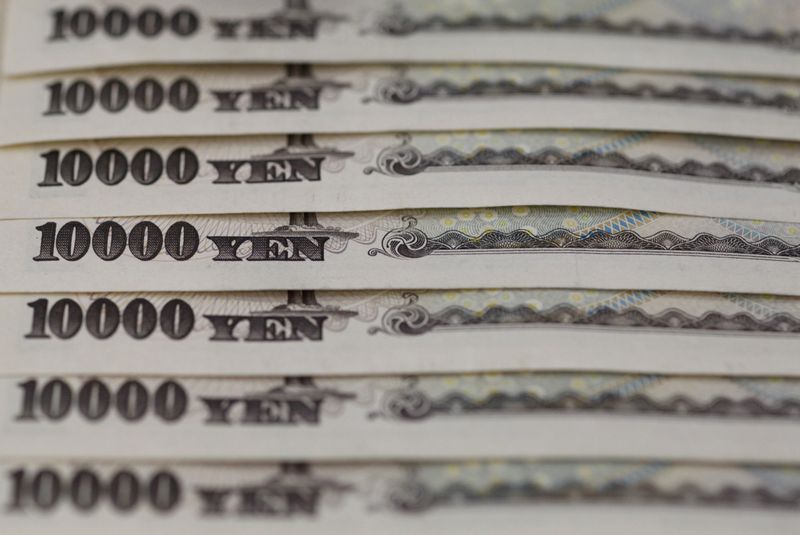By Kevin Buckland
TOKYO (Reuters) -Japanese officials may have spent some 3.66 trillion yen ($23.59 billion) on Wednesday in the latest attempt to pull the yen back from near 34-year lows, Bank of Japan data showed on Thursday.
Japan's Ministry of Finance may have spent around 6 trillion yen intervening in the market on Monday to prop up the Japanese currency after it dropped to 160.245 per dollar for the first time since April 1990, the data showed.
On Wednesday, the yen was trading at around 157.55 per dollar when it suddenly spiked, strengthening as far as 153 over the following half hour.
The Ministry of Finance each time declined to say whether or not it was behind the yen rallies, only repeating its readiness to step in at any time to stem disorderly moves.
Currency trades take two business days to settle, and Japan's markets are closed for public holidays on May 6 and May 7.
The central bank's projection for money market conditions on May 8 indicates a 4.36 trillion yen net receipt of funds, compared with a 700 billion-1.1 trillion yen estimate from money market brokerages that excludes intervention.
"This is a very large sum in a short period of time," said Shoki Omori, chief Japan desk strategist at Mizuho Securities, referring to the two rounds of apparent intervention this week.
"Now that the MOF has spent roughly 9 trillion yen, it is going to be less easy for them to intervene if the U.S. payrolls or other data come out strong," providing more momentum for dollar buying, he said. "MOF is getting pushed into a corner."
Despite the yen's sudden steep rallies, it remains down some 10% against the dollar so far this year, and was last changing hands at 155.22.
The speed with which the yen has resumed its decline despite such large scale buying shows how difficult it is to stem the downward momentum.
Analysts point to the gaping gap between Japanese and U.S. government debt yields as the force behind the yen's slide.
Even after the Bank of Japan raised interest rates for the first time since 2007 in March, policymakers have signalled a go slow approach to further tightening, which has kept long-term Japanese government bond yields well below 1%.
Equivalent Treasury yields have been pushing towards 5% as a robust economy and stubborn inflation forced markets to scale back their bets on Federal Reserve rate cuts.

Fed Chair Jerome Powell reinforced that idea on Wednesday when he reiterated that it "will take longer than previously expected" for policymakers to become comfortable that inflation will resume the decline towards their 2% target.
($1 = 155.1400 yen)